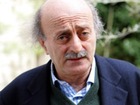Maronite Patriarch Beshara al-Rahi expressed hope on Sunday that a National Dialogue that President Michel Suleiman had called for would succeed.
Al-Rahi also hoped in his sermon that the all-party talks would lead to the adoption of a new national pact that would create a “Lebanese Spring.”
 Full Story
Full Story
March 14 opposition MP Butros Harb hoped on Sunday that Progressive Socialist Party leader Walid Jumblat would stop his support for the government to force its collapse.
“Maybe under a certain circumstance, Walid Jumblat and his bloc would change their stance and we could file a vote of no confidence,” Harb said in response to a question as to how the opposition would seek a change of government.
 Full Story
Full Story
Prime Minister Najib Miqati postponed his scheduled visit to Turkey on Saturday to follow up the abduction of the 11 pilgrims in Syria.
“I have decided to postpone my visit as the contacts and the efforts to release the abducted Lebanese are still ongoing,” Miqati said in a statement issued by his press office.
 Full Story
Full Story
Former Prime Minister Saad Hariri’s efforts to ensure the release of the Lebanese pilgrims who were abducted earlier this week have not gone unnoticed by the rival political camps in Lebanon, with both sides praising his efforts.
Interior Minister Marwan Charbel stated that Hariri “played a very important role” in the release, reported the Kuwaiti al-Seyasseh newspaper on Saturday.
 Full Story
Full Story
The March 14 forces’ meeting on Thursday laid the mechanism to topple Prime Minister Najib Miqati’s government, reported the Kuwaiti al-Anba newspaper on Saturday.
It said that they devised the practical and democratic measures needed to be taken at parliament and in the street in order to reach this goal.
 Full Story
Full Story
Progressive Socialist Party leader MP Walid Jumblat on Friday called for dialogue “for the sake of rescuing the country and overcoming obstacles,” stressing that “nothing is impossible.”
Commenting on the release on Friday of 11 Lebanese Shiite pilgrims who were abducted in Syria’s Aleppo, Jumblat told Future News television: “The phone call between (former) premier Sheikh Saad Hariri and Speaker Nabih Berri was the most important thing, because problems can be overcome through communication and dialogue.”
 Full Story
Full Story
Lebanese Forces chief Samir Geagea stated on Friday that he “understands” President Michel Suleiman’s call for dialogue “because I am aware of the amount of dangers surrounding Lebanon.”
He said before reporters in Maarab: “The dispute over the government must be resolved before dialogue can he held.”
 Full Story
Full Story
Top Lebanese officials rejected conditions set by the March 14 opposition for the resumption of dialogue, saying the March 14 coalition should participate in the all-party talks without providing any excuses.
“Before calling for (the formation of) a neutral cabinet, let it first participate in the dialogue,” Speaker Nabih Berri’s visitors quoted him as saying.
 Full Story
Full Story
President Michel Suleiman on Thursday announced that he will call for a national dialogue conference to be held in the second week of June, urging the March 14 forces to heed his call without linking it to the issue of forming a new government.
“Of course I will call for dialogue and I have already voiced several calls and informed the leaders of the topics: the defense strategy concerning when and how the Resistance's arms must be used; the implementation of the previous resolutions as to removing Palestinian arms outside camps and organizing them inside camps; and the removal of weapons from Lebanese cities and towns,” said Suleiman in an interview on LBC.
 Full Story
Full Story
U.N. Special Coordinator for Lebanon Derek Plumbly praised on Thursday President Michel Suleiman and Prime Minister Najib Miqati’s efforts to strengthen calm and stability in Lebanon in light of the recent tensions.
He said after holding talks with Miqati at the Grand Serail: “The United Nations supports all steps aimed at safeguarding Lebanon’s stability and security and the wellbeing of its citizens.
 Full Story
Full Story



